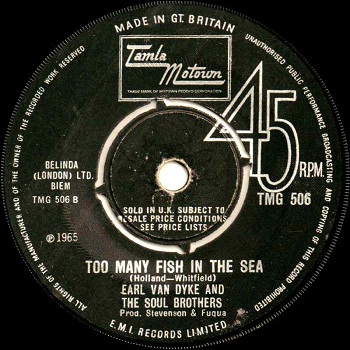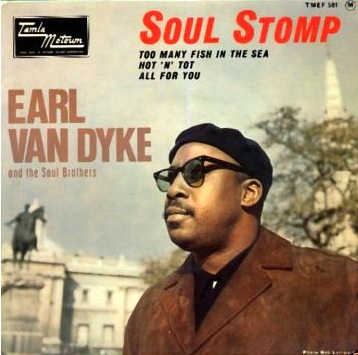Tags
 UNRELEASED: scheduled for
UNRELEASED: scheduled for
Soul S 35009 (B), January 1965
B-side of All For You
(Written by Norman Whitfield and Edward Holland Jr.)
 Tamla Motown TMG 506 (B), March 1965
Tamla Motown TMG 506 (B), March 1965
B-side of All For You
(Released in the UK under license through EMI / Tamla Motown)
 Gladys Horton of the Marvelettes, in the liner notes to The Complete Motown Singles: Volume 4:
Gladys Horton of the Marvelettes, in the liner notes to The Complete Motown Singles: Volume 4:
“When they played us the band track of Where Did Our Love Go, they also played us the band track of Too Many Fish In The Sea. We picked Too Many Fish…, becuase it had all of the music and the bongos. If you listen to it without the lyrics, you hear all of the music. When you listen to Where Did Our Love Go without the lyrics, you hear nothing.”
Fate’s a funny thing, isn’t it? As luck would have it, here’s our chance to put that to the test, as Motown keyboardist and bandleader Earl Van Dyke presents the band track of Too Many Fish In The Sea without the lyrics.
Nope. Sorry, Gladys, this isn’t very good at all.
 I’m joking, of course. As with the A-side, All For You, the band track here is absolutely fine; it’s what’s been added that spoils things.
I’m joking, of course. As with the A-side, All For You, the band track here is absolutely fine; it’s what’s been added that spoils things.
As part of a somewhat ill-advised musical venture to market Van Dyke as a marquee artist rather than an anonymous (but vital) member of the supporting cast, Motown had Earl dub vigorous new lead organ parts onto the pre-recorded band tracks of several other people’s previous Motown hits. Most of those tracks already featured Earl’s piano and keys work as part of the original records, so on many of them he’s effectively his own duet partner; as a result, most of these Funk Brothers (or “Soul Brothers”) overdubs are neither the wonderful original pop hits, nor the tough-edged jazz and blues the band wanted to be making. Instead, they’re a weird Frankenstein hybrid that probably ended up pleasing no-one: the exact same pop hit backing tracks as before, but now with Van Dyke’s awkward, parping organ pumping away over the top of it all, neither following the vocal line closely nor abandoning it completely.
The result is disappointing no matter what you were hoping for going in. The record misses the Marvelettes terribly, which was only to be expected – but it misses them in unexpected places. Most strikingly, the girls’ Doo doo doo DOO! interjections over the blaring, ominous horn figures at the end of each chorus, something I’d paid scant attention to on the original, are a real loss here. A clever musician, Earl seems to realise there’s now an unforeseen hole in the trecord, but doesn’t know what to do to replace them; he tries simply jabbing two keys repeatedly for a two-tone barrage that sounds weedy, underpowered and short of ideas (the audible noise as he repositions a switch is almost painful, you’re that embarrassed for him), he tries covering up the gap with a long, fierce note, he tries doing nothing at all. None of it works.
 Once again, Earl himself is the weak link on his own record. His jaunty style fits the sassy material quite well in places, but it’s immediately dated, and when the original song’s defining moment arrives, the part where the song calls for the cheeky interplay of four voices to sing Tall ones! Short ones! Fine ones! Kind ones!”, Earl is left stranded. It’s a blessed relief when the ripping sax from the original comes back to put him out of his misery.
Once again, Earl himself is the weak link on his own record. His jaunty style fits the sassy material quite well in places, but it’s immediately dated, and when the original song’s defining moment arrives, the part where the song calls for the cheeky interplay of four voices to sing Tall ones! Short ones! Fine ones! Kind ones!”, Earl is left stranded. It’s a blessed relief when the ripping sax from the original comes back to put him out of his misery.
Things pick up a bit after that, Earl getting a bit more straightforward, throwing in more piercing long notes and blistering sustain, as though he were layering an extra keyboard part for the original track rather than trying to replace a lead vocal – though, ironically, Earl being the frustrated jazz player he was, he probably had less fun doing it this way. Even then, it falls apart before the end, Earl going missing altogether a couple of times in the closing twenty seconds.
Pop music is hard to do right, and it demands respect. History is full of sneering, holier-than-thou dilettantes, usually “serious” musicians – rock bands, indie bands, classical composers, classically-trained singers, and, yes, po-faced jazz players – who think they could do it if they wanted to, that they could walk to number one if they so chose – because they’re clever, because they can play their instruments, because deep down they believe they’re better than all of this. They never are, and they never can.
(This really bothers me, if you hadn’t already noticed. People don’t rock up to the Olympics and casually demand to have a go at the shot put because they’re really good at archery, or applied physics, or heart surgery, and because “come on, how hard can it be to throw a metal ball? Ha ha ha.” Even the most arrogant prick you’ve ever met knows it takes years of practice, unworldly skill, and real tenacity and determination, not to mention an absurd amount of luck, to get that far – and even then, someone’s sweated blood for four years to finish nineteenth. And so it is with pop music. Now, Earl Van Dyke seems like a great bloke, fully deserving of his reputation as the quiet, dignified, respectful and respected king of Motown’s studio, and I wouldn’t dare disparage any of that – but this record is like the very embodiment of some cocky hipster believing they can just phone it in, and falling flat on their arse, to everyone else’s great amusement. Out of respect for the man, we’ll presume he was ordered to do this and paid it little mind, Motown demanding he record a new lead part over the top of an already perfectly fine pop record (and record it fast, to boot) as album filler, rather than him just strolling in and believing he could do a better job with it than the Marvelettes. Because, quite frankly, it’s embarrassing.)
If Marvelettes fans weren’t likely to be moved by this ill-judged and poorly-executed cover, it’s equally unlikely any hardened jazz cats were particularly impressed either. We can only hope Earl himself was having some fun doing this throwaway jam, splashing his instrumental karaoke all over a fine band track, because I’m not sure anyone else enjoyed the experience.
MOTOWN JUNKIES VERDICT
(I’ve had MY say, now it’s your turn. Agree? Disagree? Leave a comment, or click the thumbs at the bottom there. Dissent is encouraged!)
COVERWATCH
Motown Junkies has reviewed other Motown versions of this song:
- The Marvelettes (October 1964)
You’re reading Motown Junkies, an attempt to review every Motown A- and B-side ever released. Click on the “previous” and “next” buttons below to go back and forth through the catalogue, or visit the Master Index for a full list of reviews so far.
(Or maybe you’re only interested in Earl Van Dyke or the Funk Brothers? Click for more.)
 |
 |
| Earl Van Dyke & the Soul Brothers “All For You” |
Dee Mullins “Love Makes The World Go Round, But Money Greases The Wheel” |
DISCOVERING MOTOWN |
|---|
Like the blog? Listen to our radio show! |
| Motown Junkies presents the finest Motown cuts, big hits and hard to find classics. Listen to all past episodes here. |


I wonder if Motown was eyeing Stax & their success with Booker T & the MGs. Perhaps they thought they could duplicate this success with these recordings by Mr. Van Dyke. Perhaps Mr. Van Dyke thought this this little exercise might be a stepping stone to recording more “serious” albums. Who knows? Motown was probably testing just how far their fans’ loyalty would go. (ie would they be willing to purchase an instrumental album of their favorites tunes?) By the way, Mr. Van Dyke looks quite spiffy and “jazz artist like” on the cover photo of the EP!
LikeLike
Throwaway instrumentals like this were a staple of soul radio in those days, useful for filling extra time before the news. (Soul wasn’t quite as manaically-formatted as its pop Top 40 counterpart.) Every now and then a cut would get some attention and earn regular airplay and sales…probably what Motown was hoping for here, especially with such a familiar tune. Keep in mind that there were likely instro covers of Hitsville tunes all over the place. So maybe Motown was trying to “beat the boots” with the Van Dyke and Campbell stuff.
LikeLike
Happen to listen to “Time Is Tight” at the weekend, a great record, albeit recorded some years later, dominated by a great bass track, drum beat and organ and realised Motown missed a trick with Earl Van Dyke. Afterall, they had probably the best Bass player, drummer and organist in it’s fold. Instead of allowing the musicians to put something original together that could be as good as anything Booker T recorded, they put out this fodder. Really embarrasing and no more deserving than your score of three.
LikeLike
“Time is Tight” came at the end of Booker’s run at Stax, written for a movie that was pretty much banned in the US because of director Jules Dassin’s far-leftist leanings, and recorded for a label that was still trying to overcome some traumatic problems. Booker moved to A&M and cut a double LP with Rita Coolidge’s sister (the cover probably kept it from being sold in most of the South). Still, “Time is Tight” is perhaps the, well, TIGHTEST thing Booker & Co. ever did. Even The Clash do it justice (their bassist Paul Simonon cut his own, equally sharp version).
LikeLiked by 1 person
Love “Time is Tight”!
LikeLike
I first heard this cut on Felix Hernandez’ “Rhythm Review” in the summer of 90 or 91 (whichever summer it was that Dacid Ruffin passed away). I kept waiting for some kind of voiceover that the Marvelettes would be visiting the WBGO studios in Newark, New Jersey. Or maybe an advertisement for a Rhythm Review Dance Party. When Earl just kept playing i was disappointed despite the fact i knew this album existed. Glad i saved my money ’cause i’ve never been a fan of “Roller Rink Music”.
LikeLiked by 1 person
While I would give it a 6 or so on its on merit. The problem with this is the vocals on this gives this song life and the organ gives it more of a laid back feel (which is necessarily bad). Also the drums are mixed down on the version making it much harder to dance to.
LikeLiked by 1 person
Yeah, and like I said in the review it just has unavoidable connotations of the club ballroom, or like bogart4017 noted above, the roller rink. I think the idea isn’t hopeless – so many great Jamaican dub records around 5-10 years later would use the melodica to replace a vocal line with a very different result – but when the vocal you’re replacing is prime Motown, and you’re not really changing the rest of the track, you get… Well, this.
LikeLike